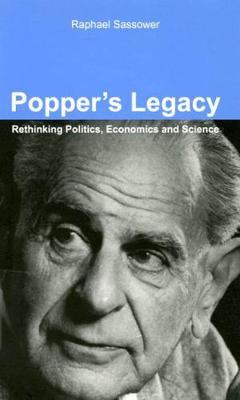Overview
Karl Popper has had an extraordinary influence on scientific and social thought. Widely regarded as one of the greatest philosophers of science of the twentieth century, he was also a highly influential social and political philosopher, a proponent and defender of the open society. Popper's Legacy examines all aspects of his work, in particular his moral and psychological insights. Once Popper's scientific legacy is couched in political and moral terms, it becomes apparent that his concern for individual autonomy does not come at the expense of institutional guidelines and social conventions. Instead, these guidelines turn out to be essential sanctions for individual freedom. Popper envisions the conduct of the scientific community as paralleling the conduct of any democratically established community, where critical rationality guides the words and actions of all participants and leadership can be changed without violence. Raphael Sassower reveals the debt many intellectual movements - such as feminism, and postmodernism - owe to Popper.
Full Product Details
Author: Raphael Sassower
Publisher: McGill-Queen's University Press
Imprint: McGill-Queen's University Press
Dimensions:
Width: 15.20cm
, Height: 1.20cm
, Length: 22.90cm
Weight: 0.210kg
ISBN: 9780773531765
ISBN 10: 0773531769
Pages: 160
Publication Date: 01 November 2006
Audience:
College/higher education
,
Professional and scholarly
,
Tertiary & Higher Education
,
Professional & Vocational
Format: Paperback
Publisher's Status: Active
Availability: In Print

This item will be ordered in for you from one of our suppliers. Upon receipt, we will promptly dispatch it out to you. For in store availability, please contact us.
Reviews
The freshest treatment of one of the most important philosophers of science and of politics of the twentieth century. Stanley Aronowitz, CUNY Popper's Legacy takes full advantage of recent scholarship to produce a unique philosophy text - one in which the author's own pilgrimage from the epistemology to the ethics of science is used to model Popper's similar journey fifty years earlier. The book succeeds in humanizing one of the forbidding giants of twentieth-century philosophy. Steve Fuller, University of Warwick The freshest treatment of one of the most important philosophers of science and of politics of the twentieth century. Stanley Aronowitz, CUNY Popper's Legacy takes full advantage of recent scholarship to produce a unique philosophy text - one in which the author's own pilgrimage from the epistemology to the ethics of science is used to model Popper's similar journey fifty years earlier. The book succeeds in humanizing one of the forbidding giants of twentieth-century philosophy. Steve Fuller, University of Warwick
The freshest treatment of one of the most important philosophers of science and of politics of the twentieth century. Stanley Aronowitz, CUNY Popper's Legacy takes full advantage of recent scholarship to produce a unique philosophy text - one in which the author's own pilgrimage from the epistemology to the ethics of science is used to model Popper's similar journey fifty years earlier. The book succeeds in humanizing one of the forbidding giants of twentieth-century philosophy. Steve Fuller, University of Warwick
"""The freshest treatment of one of the most important philosophers of science and of politics of the twentieth century."" Stanley Aronowitz, CUNY ""Popper's Legacy takes full advantage of recent scholarship to produce a unique philosophy text - one in which the author's own pilgrimage from the epistemology to the ethics of science is used to model Popper's similar journey fifty years earlier. The book succeeds in humanizing one of the forbidding giants of twentieth-century philosophy."" Steve Fuller, University of Warwick ""The freshest treatment of one of the most important philosophers of science and of politics of the twentieth century."" Stanley Aronowitz, CUNY ""Popper's Legacy takes full advantage of recent scholarship to produce a unique philosophy text - one in which the author's own pilgrimage from the epistemology to the ethics of science is used to model Popper's similar journey fifty years earlier. The book succeeds in humanizing one of the forbidding giants of twentieth-century philosophy."" Steve Fuller, University of Warwick"
Author Information
Raphael Sassower is professor and chair of philosophy at the University of Colorado, Colorado Springs.



